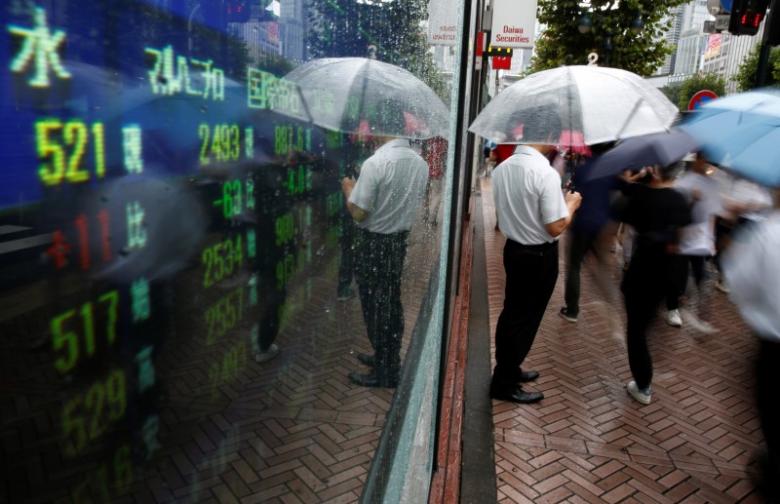Asia stocks, dollar edge up after China-induced fall
TOKYO: Asian stocks edged higher and the dollar bounced on Friday as global markets took a breather after being churned by downbeat Chinese economic data the previous day.
MSCI's broadest index of Asia-Pacific shares outside Japan .MIAPJ0000PUS was up 0.2 percent in early trade after dropping 1.1 percent on Thursday. It was headed for a loss of 2.3 percent on the week.
Japan's Nikkei .N225 inched up 0.1 percent and was on track for a 0.3 percent weekly loss. South Korea's Kospi .KS11 rose 0.6 percent and Australian stocks was up 0.1 percent.
Overnight, the Dow .DJI fell 0.3 percent and Nasdaq .IXIC shed 0.5 percent, led by falls in financial shares and weak Chinese trade numbers, although a late-day rebound in crude oil limited the decline.
China's exports fell 10 percent year-on-year in September, worse than expected, while imports unexpectedly shrank, reviving concerns about the health of the world's second-biggest economy.
"China's struggle to achieve export growth is a reflection of weak global trade. This won't prevent the Fed from increasing interest rates this year. However, it will be a handbrake on the pace of monetary tightening next year," wrote Ric Spooner, chief market analyst at CMC Markets.
China will report inflation data later on Friday morning.
The dollar index, which had risen to a seven-week high against earlier midweek on reinforced prospects of a December interest rate hike by the Federal Reserve, nudged up 0.1 percent to 97.640 .DXY.
The dollar index had risen to 98.129 on Wednesday, its highest since March 10, shored up by a rise in U.S. Treasury yields to four-month peaks as the debt market pondered a tightening by the Fed towards the year's end.
The greenback gained 0.1 percent to 103.800 yen JPY=.
It had advanced to a 2-1/2-month peak of 104.635 on Thursday before sliding to 103.340 after the Chinese trade data. It was on track to gain 0.8 percent against its Japanese peer on the week.
The euro slipped 0.1 percent to $1.1044 EUR= after pulling back from a 2-1/2-month low of $1.0985 on Thursday on the back of the dollar's broad retreat. The common currency was en route for a 1.4 percent weekly loss.
Investors will have their latest chance to gauge whether the world's biggest economy is ready for tighter monetary policy through U.S. indicators due later including September retail sales and the University of Michigan consumer sentiment report. ECONUS
The markets will also tune into speeches by Fed Chair Janet Yellen and Boston Federal Reserve President Eric Rosengren for hints about the timing of the next interest rate hike.
Elsewhere in currencies, the pound dipped 0.2 percent to $1.2226 GBP=D4. It was on track to lose 1.7 percent this week.
Sterling kept well above the 31-year trough below $1.1500 struck last Friday during its flash crash as some fears of a "hard Brexit" ebbed, it remained under pressure as the road to Britain's exit from the European Union was seen to be strewn with obstacles.
The Singapore dollar SGD=D4 firmed as the central bank held policy steady, as expected, despite a surprise contraction in preliminary third-quarter GDP.
Investors were waiting for the opening of Thailand's financial markets after the death of King Bhumibol Adulyadej on Thursday.
The prime minister urged vigilance on security in a televised address and also asked businesses to keep investing and stock market traders to maintain their holdings and not "dump" shares.
Crude oil extended gains after bouncing overnight on a US government report showing hefty draws in diesel and gasoline.
US crude was up 0.4 percent at $50.62 a barrel CLc1, having gained 1.5 percent so far this week.






